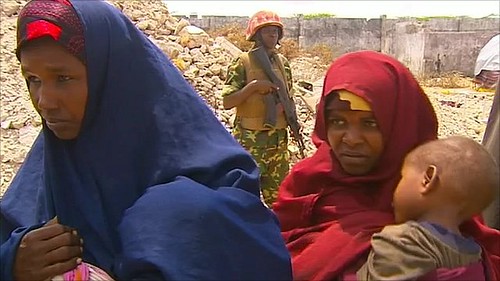
Women in Somalia have been forced to bear the brunt of the drought now taking place in the Horn of Africa region. The United Nations has delcared famine in two areas in the south of the country., a photo by Pan-African News Wire File Photos on Flickr.
Sabahi (Washington, DC)
Somalia: Somali Refugees in Kenya Lament Government Push for Relocation
BY RAMAH RAJAB, 30 JANUARY 2013
Nairobi — Eighty-year-old Abdiweli Bulle worries the recent Kenyan government directive that requires refugees to move back to camps will destroy the life he has built in Nairobi over the past two decades.
Bulle and hundreds of thousands of Somalis were displaced by the civil war that erupted in 1991 after the fall of the Somali central government. Bulle and his family of five fled to Kismayo when the unrest reached Marka, his hometown. "A year later, we could not stand the escalating violence and we had to flee again, ending up in the Dadaab refugee complex in Kenya," Bulle said.
After the government granted his family refugee status, he left the camp in 1994 on a livestock lorry and travelled to Nairobi in search of job opportunities. "My friends and I chose Eastleigh as our destination, and since then it has been my home," he said.
He soon found a job as a truck loader and used the earnings from that job to buy foodstuffs, which he started selling at the roadside in Eastleigh. Eventually Bulle brought his family from Dadaab and worked his way up to becoming a major distributor of foodstuffs, employing more than 30 people in four outlets.
Bulle said he could lose everything he has built if the government forces him to return to Dadaab, and he may again have to depend on aid.
Refugee relocation meant to improve security
On December 18th, the Ministry of State for Immigration and Registration of Persons ordered all refugees in urban areas to return to designated refugees camps. Somali refugees are expected to report to the Dadaab refugee complex and those from other countries are to report to the Kakuma refugee camp.
The ministry immediately ceased accepting and registering refugees in urban areas.
"We were forced to make this decision due to a spate of attacks," said acting commissioner for the Department of Refugee Affairs Sora Badu Katelo. "It is neither ill conceived nor discriminatory in any manner, but is meant to protect our citizens and the country from insecurity threats and attacks orchestrated by al-Shabaab and their sympathisers, who disguise as refugees."
Katelo told Sabahi that keeping refugees in the camps will make it easier for security forces to monitor criminal activity.
He said refugees who do not leave urban areas voluntarily will be moved forcefully, but acknowledged that the government had not yet come up with a plan to address cases in which refugees own property or have investments.
The government had set January 21st as the deadline for voluntary relocation, with refugees to be forcibly moved afterwards. Last week, however, Kenya's High Court temporarily blocked the decision to transfer refugees while the court hears a case against the move.
'All I know and call home is Eastleigh'
Hassan Abshir, who sells imported textiles and carpets in local markets, says he arrived at the Dadaab complex in 1991 when he was 16 years old.
"We were among the first refugees to be registered at the camp, but one day my mother fell sick. This forced us to come to Nairobi so she could seek treatment at Kenyatta National Hospital," he told Sabahi.
Upon their arrival, the family stayed in Eastleigh with Abshir's mother's friend, who then provided them with capital to start a business.
"All I know and call home is Eastleigh, and we will not accept a recall to Dadaab or Somalia," he said.
Forced relocation violates rights of refugees
Rufus Karanja, programme officer for the Refugee Consortium of Kenya, which provides legal assistance to asylum seekers and refugees, said the government's decision violates the rights of refugees and contravenes Kenya's international obligations.
"We have engaged the government on this issue on many occasions, and officials have failed to demonstrate to us how refugees in urban centres are a threat to national security and warrant the decision to have them returned to camps," Karanja told Sabahi.
According to the Refugees Act of 2006, he said, refugees have the right to settle anywhere in the country as long as they have the necessary documents to prove their status.
He said most refugees were forced to leave the camps due to deplorable living conditions, overcrowding, and lack of services and basic facilities such as hospitals and schools. By coming to the cities, refugees have been able to become independent from aid, integrating into the socio-economic life of the city by starting businesses or working as labourers, he said.
"Forcing them back to camps is like mocking their resilience and resolve to succeed against the odds," he said. "It stigmatises them and we will contest the government's order in court in order to protect the rights of refugees."
According to United Nations High Commissioner for Refugees, which has condemned Kenya's decision to discontinue services for refugees in urban areas, more than 54,000 refugees reside in Nairobi.
Returning that many refugees to Dadaab will put increasing pressure on the camps, which are already overwhelmed, Karanja said, adding that this could lead to more conflicts and instability.
No comments:
Post a Comment